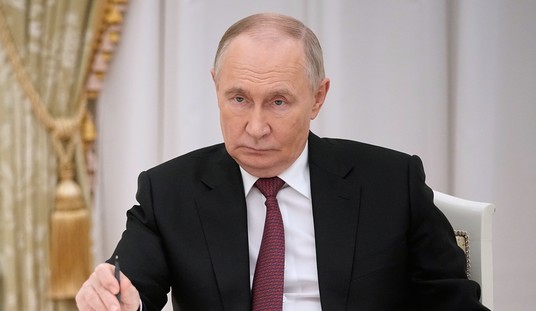The government in Kyiv has had a successful, if slow, response to the armed rebellion in its eastern provinces. Ukrainian forces have gradually divided and reduced the pockets held by the pro-Russian separatists, retaking control and sovereignty over the last few months after Russian-inspired uprisings, a reversal after the humiliating loss of the Crimean peninsula to Vladimir Putin. Now their forces have surrounded the last power base of the rebels in Donetsk, and are ready to tighten the noose:
The Ukrainian military on Monday appeared to be readying a long-awaited major assault on the rebel stronghold of Donetsk, warning civilians to leave as troops tightened their ring around the city amid heavy fighting.
Extra evacuation corridors were set up for cars bearing white flags, said Andriy Lysenko, a military spokesman. The Donetsk city government posted the corridor routes on its Web page and noted: “As practice shows, such messages are distributed before the start of active combat operations.”
Lysenko also announced that troops had taken the town of Yasynuvata, home to a key railway control center between Donetsk and Luhansk.
The military has almost encircled the two large cities, where rebels have declared “people’s republics.” Intense fighting was reported Monday in the Donetsk suburb of Marinka. Members of a volunteer militia called the Azov battalion posted photos on Facebook purporting to show them advancing on Donetsk with the Shakhtarsk battalion, but mapping technology suggests that the photos were taken in Marinka.
In other words, the fighting has gone remarkably well for a country that has had problems with political stability, even within the framework of the new, West-oriented republic. The Prime Minister just dissolved the government last month after parliamentary squabbles; the success of the national election didn’t carry unity forward for very long afterward, it seems. Yet the Ukrainians’ morale seems high, and their determination to enforce their sovereignty more firm than ever despite the losses of war. The rebels’ morale appears to be faltering, especially after shooting down Malaysia Air Flight 17 in error last month.
Or perhaps it’s the lack of Russian military support that has their morale ebbing. Putin’s forces have gathered on the border for months in varying levels of troop strength, but have yet to intervene as expected. Ukraine estimates that there are 45,000 Russian troops on the border now, which would be a peak this year if true:
The US says the Russians could move on Ukraine at any time:
Russia has roughly doubled the number of its battalions near the Ukrainian border, Western officials said Monday, and could respond to the Kiev government’s gains there by launching a cross-border incursion with little or no warning.
Over the past several weeks, Russia has built up 17 battalions — totaling 19,000 to 21,000 troops, according to one Western estimate — into a battle-ready force of infantry, armor, artillery and air defense within a few miles of the border. In addition, it has vastly expanded its firepower, increasing the number of advanced surface-to-air missile units to 14 from eight, and deploying more than 30 artillery batteries, according to the officials.
The Kremlin’s intentions in increasing its military abilities remain unclear. President Vladimir V. Putin of Russia could be seeking to pressure Ukraine and the United States to agree to a political settlement that would grant the eastern provinces of Ukraine maximum autonomy. But Mr. Putin, Western officials fear, may also be developing the option to intervene more directly if it appears that the pro-Russian separatists in Ukraine are on the verge of defeat. …
Another senior American official added, “The more success Ukrainian forces have, the more pressure there is on Moscow to escalate.”
There are, though, declining returns the longer Russia waits to intervene. The legitimacy of the rebellion took a big hit with the MH17 shootdown, and their losses have eroded what’s left. A Russian intervention at this point will look a lot less like a liberation of ethnic Russians and more like a land grab, plus it will be all the more difficult to roll back Ukrainian troops rather than hold them off.
So why wait? The economic sanctions could be one reason. The West finally got serious about going after the Russian economy rather than just a few Putin cronies and their travel options, and a ground invasion will force the US and EU to crack down even harder. The MH17 shootdown might also have Russians thinking twice about explicitly allying with the rebels. It could just be a survival issue; perhaps Putin calculates that the rebels aren’t really all that viable if they can’t hold their own territory in the Russian-speaking eastern provinces, and doesn’t care to get involved in an occupation that will produce significant economic and political damage.
Or it might just mean that Putin’s on his own schedule, and the time isn’t ripe yet. If he waits for the rebels to collapse, them he won’t have much trouble pushing them aside and annexing the eastern provinces in a military conquest. That’s more or less what happened in Crimea, only without Ukraine choosing a military confrontation over it. Putin knows that Ukraine won’t give up their eastern provinces as easily, though, and he could be calculating just how much value he’d get out of the war it would provoke. The only option for the West is to make sure Putin knows how much damage he’d do to Russia in the long run if he moves forward.








Join the conversation as a VIP Member